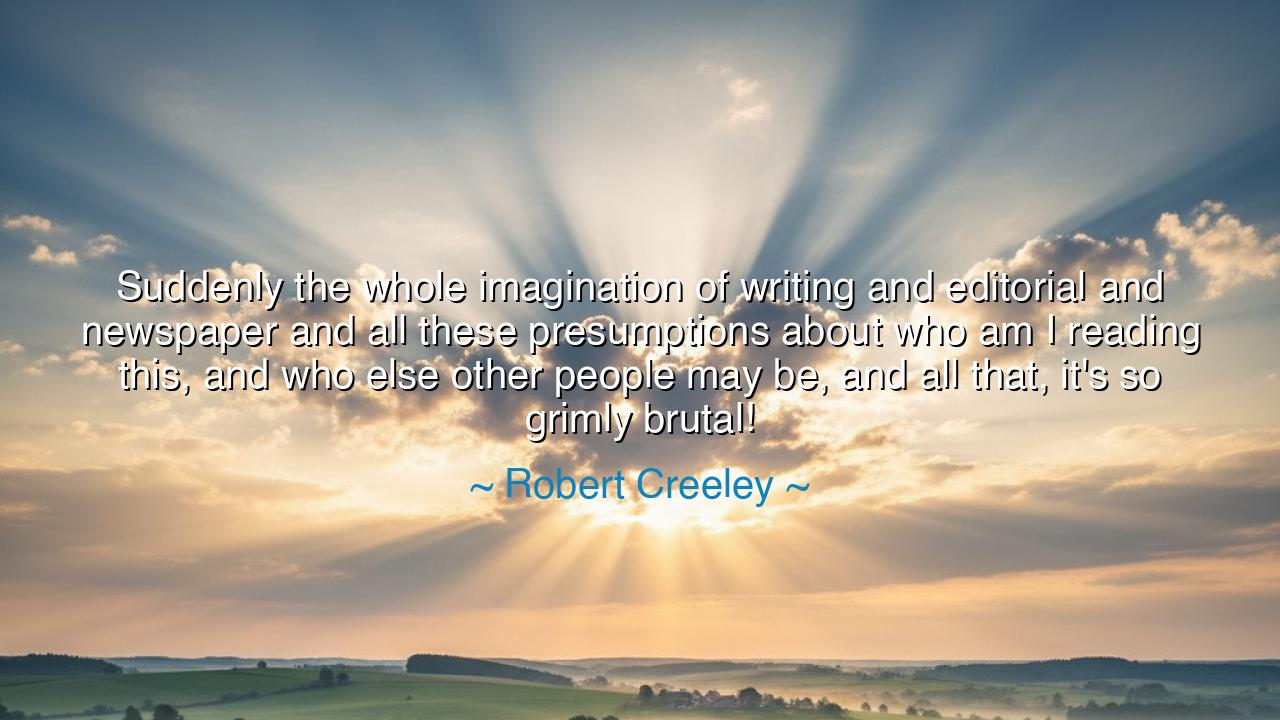
Suddenly the whole imagination of writing and editorial and
Suddenly the whole imagination of writing and editorial and newspaper and all these presumptions about who am I reading this, and who else other people may be, and all that, it's so grimly brutal!






“Suddenly the whole imagination of writing and editorial and newspaper and all these presumptions about who am I reading this, and who else other people may be, and all that, it’s so grimly brutal!” said Robert Creeley, the poet who stood at the crossroads of modern thought and ancient feeling — a man who sought honesty in the simplest words and truth in the barest form. In this lament, Creeley lays bare the torment of the writer’s imagination when confronted by the machinery of the world — the editors, the critics, the faceless masses of readers who demand meaning, judgment, and perfection. His cry is not one of bitterness alone, but of sorrow for what creation becomes when it must pass through the brutality of expectation.
To imagine, for Creeley, was once a sacred act — a private dialogue between soul and silence, between the inner voice and the mystery of the world. But the moment that imagination steps into the public arena — into writing, into editorial judgment, into publication — it is no longer innocent. It becomes burdened by the weight of others’ eyes. The writer begins to ask not “What do I feel?” but “Who will read this?” and “What will they think?” Thus, the imagination, once wild and free, becomes entangled in the web of perception. What was born in purity begins to decay in exposure. And this, Creeley calls “grimly brutal” — the violence done to art when it is forced to perform for approval.
This truth is as old as creation itself. The prophets, poets, and philosophers of old all felt the same anguish. Socrates, condemned for his ideas, saw how the world punishes the thinker who dares to speak without pandering. Emily Dickinson, retreating into her room, wrote for herself alone — not for an audience, not for applause. She understood what Creeley mourned: that once the world begins to judge the imagination, its sacred spontaneity begins to fade. The act of creation, when made to conform, becomes performance, and the artist’s heart grows weary beneath the gaze of the crowd.
Creeley’s words also reveal a profound understanding of the loneliness of the writer. To write is to throw one’s thoughts into the abyss, uncertain of who may receive them, uncertain even of what they may become once interpreted by others. Every writer knows this dread — the moment when words, once pure in the mind, are stripped bare before an unseen multitude. Who are these readers? What do they seek? Are they kind? Are they cruel? The presumptions about “who am I reading this” and “who else other people may be” become a maze of speculation, a prison for the artist’s soul. The writer’s vision, which once flowed from the heart, begins to falter under the imagined weight of all those watching.
Yet in this lament, there is also wisdom — the recognition that such brutality is part of the writer’s pilgrimage. For to create in the world is to wrestle with misunderstanding, to bear rejection and misinterpretation without surrendering one’s truth. Van Gogh, whose paintings were ridiculed and dismissed, endured the same brutality. Yet he continued, his imagination unbroken. Though the world mocked him, he painted the light that only he could see. His life teaches us, as Creeley’s words remind, that the act of creation is always an act of courage — to imagine despite judgment, to write despite fear, to speak despite silence.
Creeley’s despair, then, is also a kind of reverence. He understood that writing is a sacred act, and that to expose it to the mechanisms of the world is to risk its corruption. Yet he also knew that art must venture forth, even at the cost of wounding. The writer, like the warrior, must face the brutality of the battlefield — not of swords, but of words and opinions — and still keep faith with the imagination. For though the world may tear apart the work, it cannot destroy the spirit that created it.
So let this be the lesson, passed from the poet’s sorrow to all who dare to create: Do not let the brutality of expectation silence your imagination. The editor may demand, the critic may scorn, the reader may misunderstand — yet the inner voice remains your truest guide. Write, paint, sing, or dream not for applause, but for truth. For the imagination, once awakened, is the most human of all powers — and though the world may bruise it, it can never kill it. Let your art be born from sincerity, and let it return to silence if it must — for only in the honest act of creation, free from fear and demand, will you find the peace that Creeley sought, and the immortality that all true artists earn.






AAdministratorAdministrator
Welcome, honored guests. Please leave a comment, we will respond soon